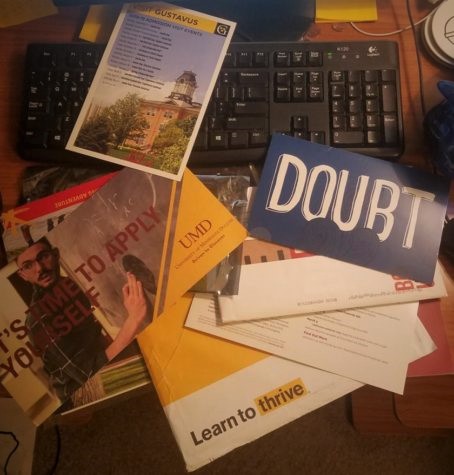Gap Years: a much needed brain-break

Mail piled mail, inundating a desk.
January 30, 2019
The transition from regular high school life to the fast-paced independent lifestyle of college is one that most people learn to overcome. Over time the stress levels for preparing for college have risen due to the increase in price for higher education. With that being said, why not just take a year off from school? This alternative is one that isn’t widely used in America.
Taking a year off school, otherwise known as a gap year, is a way to better prepare yourself before college. A gap year is an opportunity to grow and learn without having to worry about school. This offers young adults a brief period of time to experience what it is like living without juggling school work, thus creating more time for constructive thinking and planning.
Former LHS senior Cash Lapour decided to take a gap year before going off to college.
“I personally decided to take a year off to save money,” said Lapour. “l I’ve been working full time the past few months, so I’ll have a lot more money saved up to pay for college than someone who would begin school right after graduation.”
This brings up a very good point when discussing gap years. While some might have dreams of using a year off to travel the world or to spend money on unnecessary or unessential goods, it is far better to use the time to earn money. I think that taking a year off of school is valuable if you decide to manage it in an effective way, like Lapour. This time can be used to grow as an individual and to truly find whatever your passion is.
“The Main benefits are having time to experience what life is like while not in school,” said Lapour. “It has helped me a lot with deciding what I want to do when I do begin college.”
And in this day and age it is, without a doubt, a very good idea to spend time earning and saving money before going off to university.
According to stuendtloanhero.com, “…the average student loan debt for Class of 2017 graduates was $39,400*, up six percent from the previous year.”
It is safe to assume that this number will only go up over time. Wouldn’t it make sense to go into college with a reasonable amount of money as opposed to going into with little to no money and no idea when you’ll get a job? Some students will find high paying jobs earlier than most, but I still think it is better to work instead of hoping you will get a job during college.
On the flip side, some people think that taking a gap year has more negatives than positives. After looking at several websites, I have determined that there four major “downfalls” to not going to college right after high school. They include:
- It puts you a year what you should be
- You take the risk of losing educational momentum
- Gap years can be expensive
- There is extra planning
These concerns are genuine, but I do not think any of them would outweigh the positives of taking a free year. Sure, you will be behind your graduating class, but that doesn’t matter. Most colleges have a wide variety of age groups, thus creating an already diverse environment. You might be older than some of the people in your class but you will by no means be the only person that “stands out” age wise.
Losing educational momentum might be a concern, but I do not think it is a con. If somebody takes a year off of school and decides they do not want to attend a university that is not necessarily a bad thing. Higher levels of education are not for everybody and this can be determined during a gap year, given that people are given the freedom to think for themselves. The other main problem is that gap years can be expensive. But as I said before, gap years do not have to be costly if your time is managed well.
Lastly, there is extra planning for students who decide to take a year off. This, however, is a given. Anybody who has already dedicated their time to considering not attending college right away will not have a problem planning their future. I really do not think that this point is relevant since either way people are going to have to set aside time to plan out their lives.
The pros and cons that come with taking a year off are going to be different for everybody. Some people might find it too difficult to plan an extra year without school, whereas others may have little to no trouble figuring out what they want to do with a free year. I think that everybody should consider taking a break before committing to what can turn into countless years of higher education. Taking a break and preparing yourself financially offers more time for important decision making which can greatly affect your future. Plus you might even have a little bit of fun along the way.








